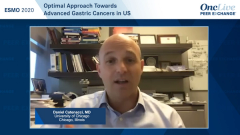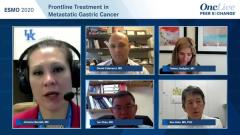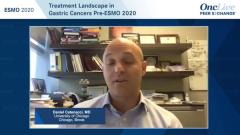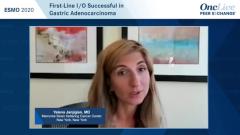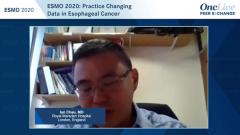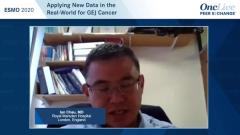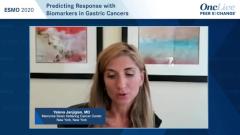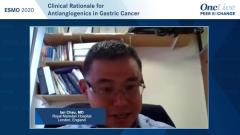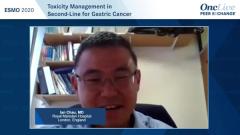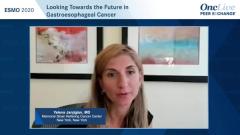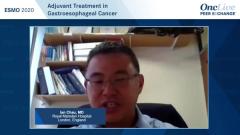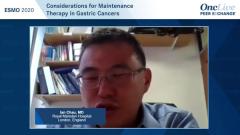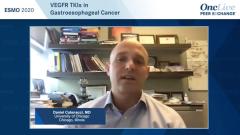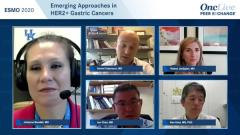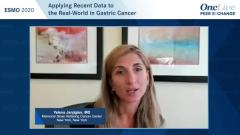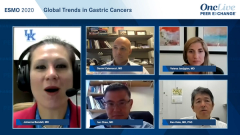
Predicting Response With Biomarkers in Gastric Cancers
Episodes in this series

Transcript:
Johanna Bendell, MD: What’s also very interesting as opposed to where we were a couple of days ago, now the concept of utilization in the first line is checkpoint inhibitor plus chemotherapy. We had thought previously that even if you’re going to use it in first line, even for a very select population, it would be the checkpoint inhibitor alone. Certainly, we’ve had some education that the role is probably more for checkpoint plus chemotherapy. What about other biomarkers? Yelena, we have talked a little about MSI [microsatellite instability], we’ve talked about PD-L1 status. What about other markers, like tumor mutational burden [TMB], that might affect response to checkpoint inhibitors in this patient population?
Yelena Janjigian, MD: We stressed the point about MSI, and we really need to drive this home. In first-line settings and even early stage disease, it is critical to know the patient’s MSI status. I would not necessarily wait for NGS [next-generation sequencing] because it may take several weeks to get a result and the tissue quality may be suboptimal. Therefore, you may not have sufficient mutation calls if you have a small quantity of the tissue. Doing MMR [mismatch repair] IHC [immunohistochemistry] is likely the most practical way, at least in perioperative setting and certainly in the stage IV first-line setting as well. Why do we do this? Because there’s a huge body of literature now, in gastric but also in colon and other diseases, that MSI tumors tend to not respond as well to chemotherapy.
In the neoadjuvant approach, there’s been a meta-analysis, but also Lizzie Smyth looked at this data through the MAGIC protocol. If I know the patient is MSI high, I tend to steer away from perioperative therapy, and I recommend surgery in those patients. We can talk about other adjuvant approaches in this setting. Similarly, in metastatic disease, 1 critical piece of data that came out of KEYNOTE-062 is that in first-line pembrolizumab compared with chemotherapy, the hazard ratio for this trial was 0.2.
It’s a small subgroup analysis, and this was not unlike KEYNOTE-177 in colon cancer, where the study was purely designed to answer this question. KEYNOTE-062 looked at it in a subgroup analysis, but I find these data compelling and convincing. If the patient has an MMR-deficient or MSI-high tumor, I do not recommend doing chemotherapy in the first-line setting, and we’ve been successful in getting immunotherapy for these patients if they have small-volume disease. Certainly, both KEYNOTE-062 and CheckMate649 suggest that if you’re nervous about avoiding chemotherapy in this setting, a combination of chemotherapy and immune checkpoint inhibitors could be considered.
Beyond MSI, 1 of the biomarkers that was very exciting 2 or 3 years ago but now is becoming a bit more controversial—if you follow the literature and the controversy on Twitter and other platforms—is tumor mutational burden, which has been proposed as a biomarker for immune checkpoint inhibitors. The FDA actually approved pembrolizumab in third-line setting based on a small study that was recently published in Lancet Oncology. Nonetheless, TMB tumors may have a higher response rate to immune checkpoint inhibitors. In gastric cancer, most TMB-high tumors—defined by greater than 10 mutations per megabase—also happen to be MSI cancers. In our disease, it may not be as big of a driver, and the data are a bit controversial and some of the initial publications in TMB-high cancers have been refuted.
Lastly, the most recent updated analysis in POLE tumors that included other cancer types, including gastric, endometrial, and colon cancer, suggests that for immunotherapy, the immune checkpoint inhibitor in this study was nivolumab at ESMO [European Society for Medical Oncology Congress] 2020. If you have a POLE mutation of known pathogenic mutation or a mutation of variant of unknown significance, although you could argue you know it’s significant if the patient is responding to therapy, those patients tend to have as high a response rate as 30% in the treatment-refractory setting.
It was a small data set, but it suggests that NGS should be done as we discussed earlier. It may not be time efficient, so you should still do HER2 [human epidermal growth factor receptor 2] IHC, PD-L1, and MMR IHC in real time. NGS is helpful because it gets you a sense of ERBB2 amplification; it’s a predictor of outcome by NGS as well in gastric cancer. It gets you the TMB status. You’ll know the POLE status. We can talk a little about fibroblast growth factor receptors, fusions, and amplifications that may be drivers in subsets of gastric cancer. Now that NGS is considered approved at least in the United States in metastatic and locally advanced setting, one should do that if tissue quality is sufficient.
Transcript Edited for Clarity


